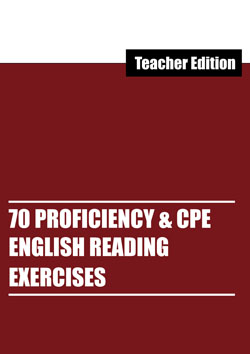
We all know that reading regularly in English is one of the best ways to get our students to improve their level in English (it broadens their vocabulary, it reinforces their knowledge of grammatical structures etc...). The problem is getting our students to actually do it.
In every class I've taught, I've always stressed the importance to them to read as much as possible outside of class in English. Unfortunately, apart from the most dedicated, few seldom do.
If you are an English learner, click here to learn about the student version of this eBook.
Why they don't
It can be easy to put the blame on our students for not doing this. And it is true that many of them (like all of us) can be either too lazy or are just too busy to get around to reading things in English outside the class.
But finding the right things to read is actually quite difficult and time-consuming. Although they do now have unlimited access to literally billions of articles in English which they can read for free on the web, it can be difficult for learners at this level to find articles themselves which both broaden their vocabulary and are interesting to read. So, it's unsurprising the majority of them don't bother reading or only read articles on topics where they already have a good command of the English vocabulary used in them. Neither of which helps them in improving and expanding their knowledge of the language.
It makes our lives more difficult
Although it may not seem like it is our problem as teachers whether our students regularly read in English outside of class, it is. The practice which our students do in English outside of class is as important as what they do with us in class for determining how quickly they progress. The less they practise their English, the slower they progress.
To overcome this, I decided to create my own material for them to read regularly and a method that ensured that they actually read it. Material which was not only right for their level, but also interesting for them to read. It's taken me about 2 years to create all of this and to get it just right. And the result of all this hard work, is this eBook.
What's in the eBook
To start with, this edition of the PDF eBook has been specifically designed to be used by teachers with their students. There are 70 printable reading exercises and each exercise includes:
- A long text (none less than 1000 words)
- A vocabulary exercise
- A sheet for students to create sentences with the vocabulary
- 5 questions for you to ask your students about the topic they've read
Click here to see a list of the titles of the text of the 70 reading exercises
The 70 texts in the eBook
- The intelligence of plants
- Superstitions and their strange origins
- Jordan: A spectacular country with unfortunately too few tourists
- The myth of meritocracy in education
- The comparative failure of online grocery shopping
- Can fashion be considered to be art?
- Ten inventions that radically changed our world
- What makes solo endurance athletes keep going?
- Is human habitation on Mars possible?
- The questionable validity and morality of using IQ tests
- Is wind power the answer for our future energy needs?
- The history of astrology
- Our changing spending habits at Christmas
- The importance of stories for us
- Is lab-grown meat a good thing for us?
- Is there any difference between men's and women's brains?
- ASMR: Making money through making very soft sounds
- Why many of us don't really work when at work
- The worrying disappearance of the right to free speech at British universities
- Changing the image of classical music
- The discovery which is reshaping the theory of our origins
- Sleep and its importance
- Wealth and happiness: Are the two connected?
- Punishing the parents for their kids underage drinking
- Reintroducing wolves and other lost species back into the wild in Britain
- Everest and death: Why people are still willing to climb mountain of the dead
- The debate on whether being overweight is unhealthy
- The importance of Conrad's 'The Heart of Darkness'
- The resistance to moving from steam power to electricity in manufacturing
- The significance of colour
- The work of artist Jackson Pollock
- Food imagery and manipulation
- The urgency of acting now to stop climate change
- Trying to reverse the declining demand for humanities majors in America
- How the tulip caused the world's first economic crash
- A review of the film "Three Billboards Outside Ebbing, Missouri"
- Our personality traits appear to be mostly inherited
- Is it right for people to go to Africa to hunt?
- The new palaces of the 21st century
- Understanding contemporary dance
- America's six best hiking trails
- Why the disappearance of livestock farming is good for us all
- Can we trust our memories?
- Why Mary Shelly's Frankenstein is still relevant today
- Customer complaints are good for business
- How the discovery of plate tectonics revolutionised are understanding of our planet
- Is there a conflict between saving the planet and reducing poverty?
- No more rock stars anymore
- Are the rich better than the rest of us?
- Globalisation and how societies have always evolved
- The reasons for the decline in wine consumption in France
- The merits of being a fair-weather sports fan
- The reason why homeopathic treatment does work with patients
- Is the gentrification of parts of cities a really bad thing?
- The origins of the metric system
- Do prisons work?
- All you need to know about depression
- The future of work
- The difficulties for us to colonise the galaxy
- The shredding of Banksy's "Girl With Balloon" at auction: Stunt or statement?
- Why a decline in the planet's biodiversity is a threat to us all
- Should we profile people in society to predict behaviour?
- A review of Vincent LoBrutto's biography of Stanley Kubrick
- Is free trade between countries a good thing?
- Is freshwater the biggest challenge we will face this century?
- The problems of relying on metrics to gauge performance
- Should you use the carrot or the stick with your children?
- Stefan Zweig: The life of a citizen of the world
- The evolution of science and thought throughout the ages part 1
- The evolution of science and thought throughout the ages part 2
Close the exercise list
In addition to this, you'll also find in the eBook a tried and tested method for using these reading exercises with your students.
How the eBook will help you and your students
The material in this eBook will improve your students' English in a number of different areas:
Improve their reading
Each reading exercise has a text that been specifically written and adapted for people whose level of English is proficiency (or high advanced) or are studying for the Cambridge CPE exam. The texts cover a wide range of different topics (from science to art and everything in between) and this will broaden your students' knowledge of English vocabulary.
Improve their vocabulary
In addition to the text, each reading exercise contains a vocabulary exercise. In this, your students will learn the meaning of 7 carefully selected phrases and words from the text. These are words and phrases which I have noticed over that students at your level commonly don't know, don't use or use incorrectly.
Make them remember the vocabulary
It would be pointless for your students to learn the meaning of these words and phrases and then forget what they mean. To ensure that they do remember them, each reading exercise comes with a sheet for your students to write a sentence in their own words for each of the 7 words and phrases they learnt in the vocabulary exercise.
It'll help their speaking as well
These reading exercises have also been designed to improve your students' ability and confidence in speaking in English as well. The topic of each reading exercise has been selected to make students interested in what they are reading about. Included in the eBook is a tried and tested method for using the reading exercises for getting your students to talk together in class, not just about the text, but about the topic in general. To help you do this, you'll find each reading exercise has a list of at least 5 questions which you can ask them after they have done it.
You'll be surprised how much your students' speaking in English will improve after doing these reading exercises for just a few months.
Make your life easier
The more your students read and speak in English, the quicker they improve. This makes happier students, happier classes and higher grades. All of which makes your life as teacher a lot easier.
Get your copy now
The cost for all of this material is €17 (around $20). When you take into consideration that the material is designed to be used for a full academic year and how much it will help both you and your students, it is cheap for the price.
I have been using this material and method with my own students for over three years now and I'm very happy with the results I've seen. Not only with seeing how it has improved their level of English, but seeing how they enjoy speaking together and expressing their opinions about the topics of the reading exercises that they have done.
Click the button below to buy your copy.
